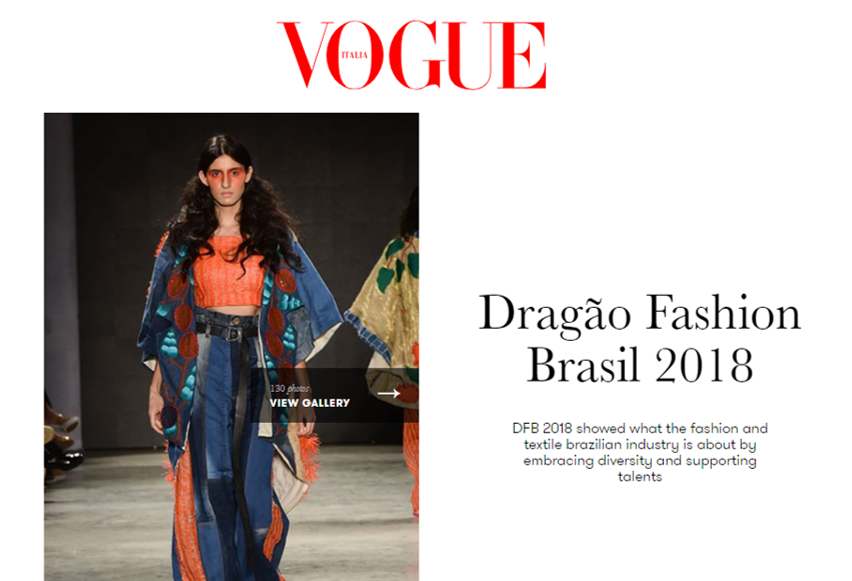Dragão Fashion – maio 2018 – Vogue Itália
Dragão Fashion Brasil 2018
Right by its impressive and beautiful beaches, the city of Fortaleza, capital of the northeastern Brazilian state of Ceara, witnessed the largest multidisciplinary exhibition and meeting of authorial design of Latin America, Dragão Fashion Brasil Festival (DFB 2018). Held between May 9th and 12th, at the Maritime Passenger Terminal of the Port of Fortaleza, this festival blended together designers with different backgrounds and experiences, from university students to stablished labels and independent new talents.
Powered by both the Brazilian Textile and Confection Industry Association (Abit) and Textile and Fashion Industry’s Internationalization Program (TEX Brasil), this event’s aims to promote innovation and access to different ways of creative production, based on the principles of Circular Economy and Creative Economy. Inclusion, diversity and support of the new are key values of DFB, where emerging labels and designers who do not fit on traditional formats are given a space to show their work.
Since 2001, higher education and technical institutions from different regions of the country have their runway moment at the New Talents Contest (Concurso dos Novos). This year the eight teams of the participating institutions had to work around the theme of “Circular Economy: all angles of innovation and renewal in thinking and making fashion”. SENAC SE, Facultade Ateneu, IFRN – Campus Caico and Facultade Santa Marcelina were the first ones to show their collections, followed on a second day by UFC, UFPI, Univ. Estácio de Sá and Univ. Estadual Santa Catarina. The award was given to the design team from SENAC SE, who were inspired by the brazilian artist Arthur Bispo do Rosário, in favor of ethnic and feminine empowerment and built their collection by using artisanal embroidery techniques and upcycling fabric and button remains.
Questioning the “dictatorship of the beautiful”, Lindebergue Fernandes presented his manifesto of love, an ode to diversity of both genres and bodies, a powerful and conceptual collection which faces the ideals of imposed beauty and perfect bodies. Also inline with the current agenda of women’s call for equality and respect, many designers addressed these matters in their collections by presenting strong and powerful women. Rich in details and textures, Brayann Ivanovick’s collection combines African culture with neon Sertão references, evoking futuristic warriors . As for André Sampaio, his collection of nocturnal bikers, combines sportswear, crochet knits and lingerie into strong and daring brazilian-style “femmes fatales” looks. Empowering and dynamic, a call of respect for women was Weider Silveiro’s presentation, a collection reigned by a balanced mix of prints and shapes, from polka dots to japanese flowers, deconstructed tailoring and 80’s inspired sportswear, as an exaltation of the feminine.
As for Herculano Marques, he worked around the idea of expanding and exploring the boundaries of the female body and what’s to be seen, through see-through and shimmery cocktail dresses. David Lee’s intention was to externalize feelings, the subjectivity and emotions we all have, to show ourselves for his menswear collection. Unfinished colorful and soft knits were layered to deconstructed tailored pieces, as the the bodies show themselves as more sensible and vulnerable. Geometric construction from denim cut-outs and prints was the key to Fabio Caracas’ collection called “Fragments”, a perfect blend of urban coded oversize sportswear and tailored pieces.
Regional references and the recovery of traditional artisanal techniques were also issues addressed during the DFB. Inspired by the traditional story of the Alagoas Warrior, Johnson Cavalante created colorful and festive looks, where multicolor stripes and prints are modernized into updated pieces. Saldanha’s trigger for their latest collection was the coming together of tailoring and windsurf, where sporty sails, straps and ropes blended with reinterpretated shirts and suits. “Cúcucias”, Iury Costa’s collection pays homage to the plastic artist Sérvulo Esmeraldo, producing a range of pieces that go from oversize crafty denim overalls to lightweight almost canvas-like delicate dresses.
Opulent and powerful, DFB 2018 showed what the fashion and textile brazilian industry is about by embracing diversity and supporting talents.
by Pia Rey
https://www.vogue.it/en/vogue-talents/news/2018/05/28/dragao-fashion-brasil-2018-dbf/

